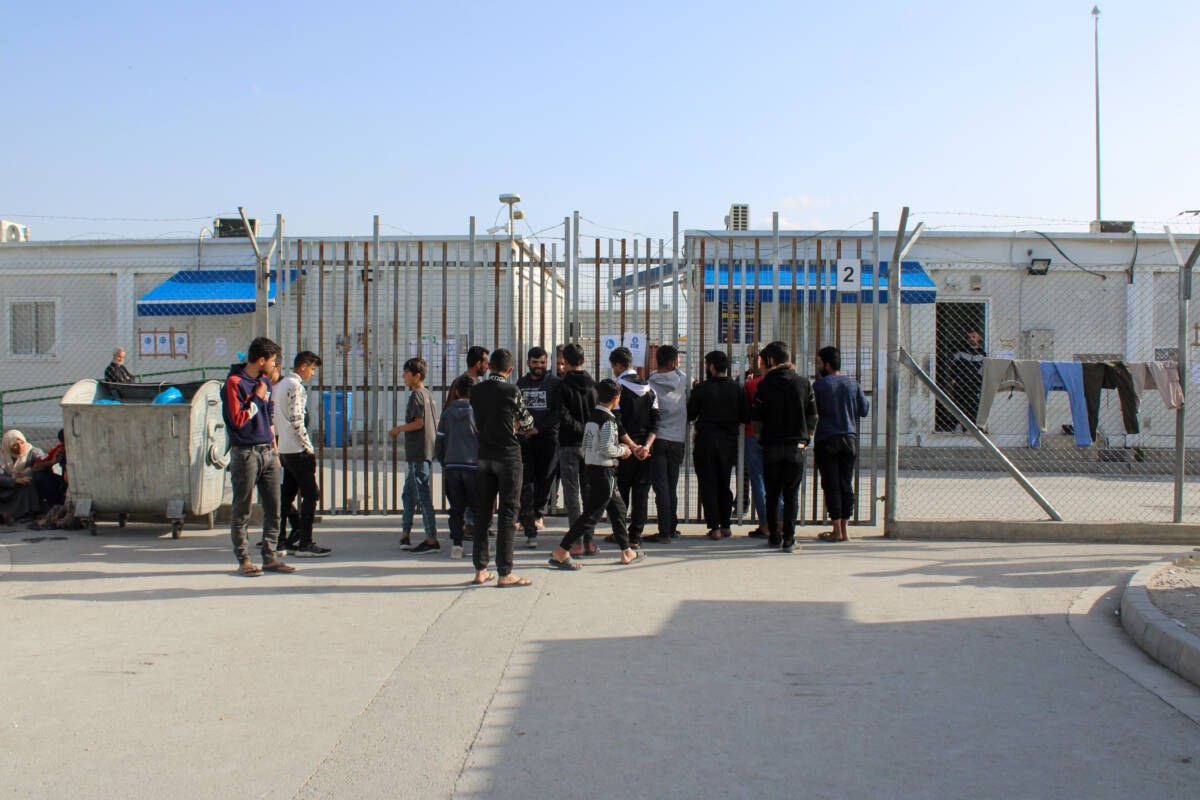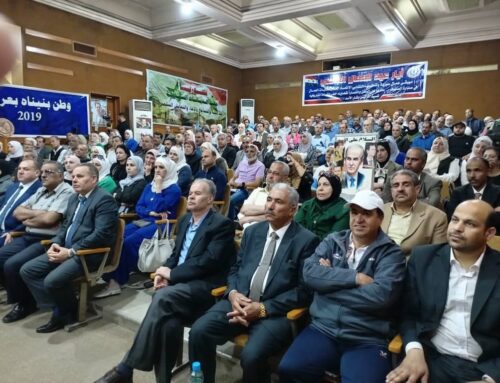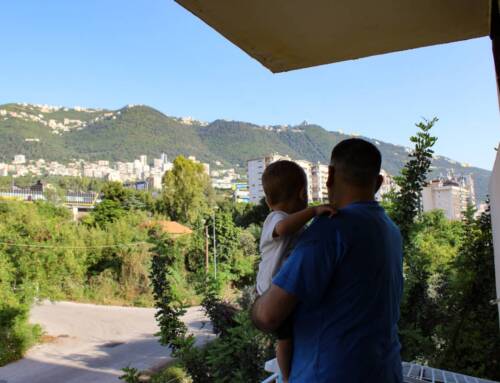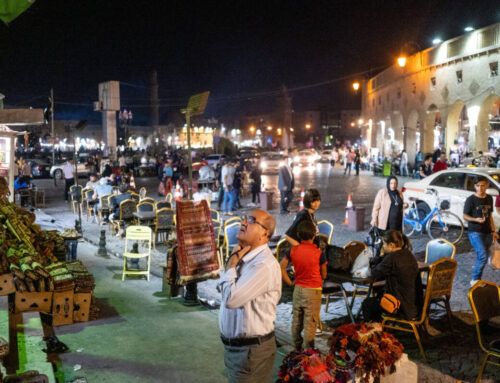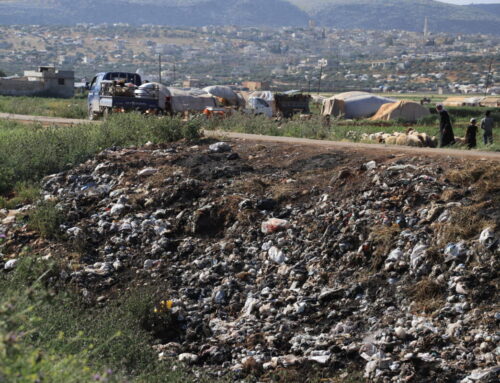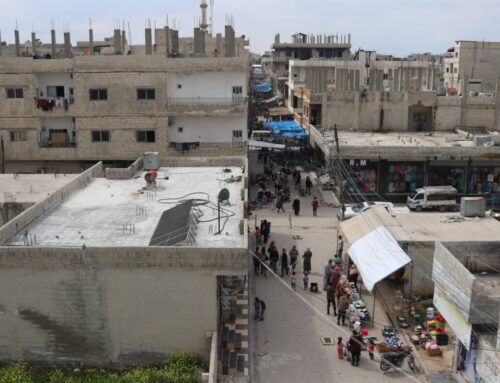Syrians sail for Cyprus in the thousands as island seeks to stem the tide
The number of Syrians making treacherous sea crossings to Cyprus has spiked, prompting the island nation to announce it will no longer process Syrian asylum applications. Many fleeing Lebanon and Syria are not deterred.
30 April 2024
POURNARA/NICOSIA — As the small fishing boat carrying Rihab al-Ahmad, her husband and four children pushed off of the Syrian coast and sailed for Cyprus on February 20, a better future seemed almost within grasp. Rocked by the waves, al-Ahmad held tight to her youngest son, six-year-old Saifuddin.
Nine days later, she would bury him at sea.
“From the second we got on the boat, Saif was in my arms,” the 31-year-old mother told Syria Direct nearly a month later at her small caravan at the Pournara Reception Center in Cyprus.
The journey to the island nation was only supposed to take a day. But, less than 24 hours in, the boat ran out of fuel and slowly came to a halt, drifting at the mercy of the Mediterranean currents. The little food and water on board was quickly consumed. Overwhelming thirst and hunger overwhelmed the more than 31 passengers.
“I wasn’t afraid [for myself],” al-Ahmad said. “But I was terrified for my child, who was in my arms. He was hungry and thirsty, and I couldn’t feed him or give him water.”
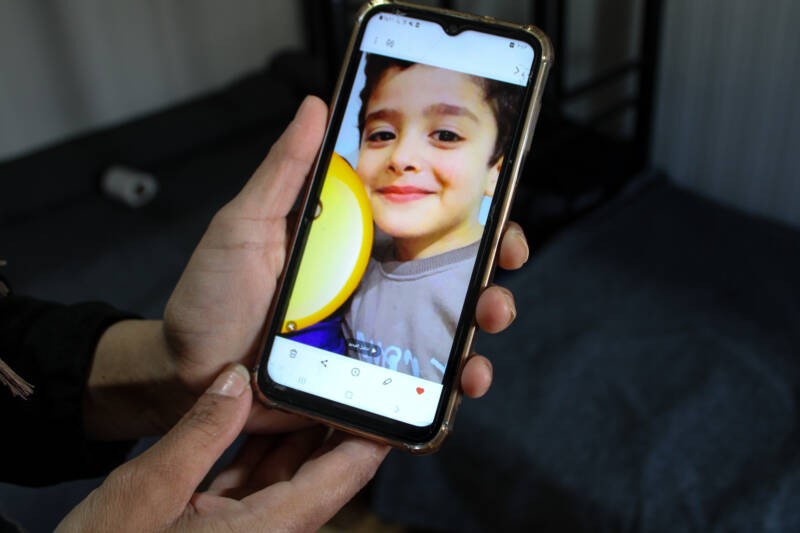
Rihab al-Ahmad shows a photo of her son, six-year-old Saifuddin, who died during the family’s boat crossing from Syria to Cyprus, 27/03/2024 (Hanna Davis/Syria Direct)
After several days at sea without enough food or water, Saifuddin’s health began to significantly deteriorate. One day, his eyes rolled back in his head. He lay still in his mother’s arms, his gasps for breath gradually fading.
“He couldn’t bear it anymore. His body was too weak,” al-Ahmad said, tears filling her eyes. She paused, then continued: “His soul left his body around 2 in the morning, while he was in my arms.”
Al-Ahmad held Saifuddin for days after he died, as his skin took on a blue-yellow hue. Finally, still stranded, she had to let him go. With her husband, she placed her son’s body into the dark water. He sank, buried by the waves.
‘No way to survive’
The number of Syrians attempting the treacherous sea crossing from Syria and Lebanon to Cyprus, a European Union (EU) member state, has spiked. Over the first four months of 2024, at least 50 boats arrived, compared to just 10 during the same period in 2023, according to data from the UN Refugee Agency (UNHCR) in Cyprus.
Nearly 3,000 Syrians applied for asylum in Cyprus between January and March of this year, according to the UN agency. In response, Cyprus announced it would no longer process asylum applications from Syrians on April 13.
Some, like al-Ahmad’s family, come directly from Syria, but most arrive from Lebanon, where the economy has crumbled and anti-refugee violence is soaring, Andreas Georgiadis, the head of the Cyprus Asylum Service, told Syria Direct at his office in the capital Nicosia. Just outside, around 20 asylum seekers stood in line, waiting to inquire about the status of their applications.
From January to April 17, UNHCR in Lebanon verified the departure or attempted departure of 59 boats from Lebanon carrying 3,191 passengers, mostly Syrians. The number of people leaving is nearly 60 times higher than over the same period in 2023, when UNHCR saw only three boat movements carrying 54 passengers, UNHCR Lebanon spokesperson Lisa Abou Khaled told Syria Direct.
“It is evident that these are desperate journeys undertaken by people who see no way to survive in Lebanon as the socio-economic situation is continuously worsening,” Khaled said.
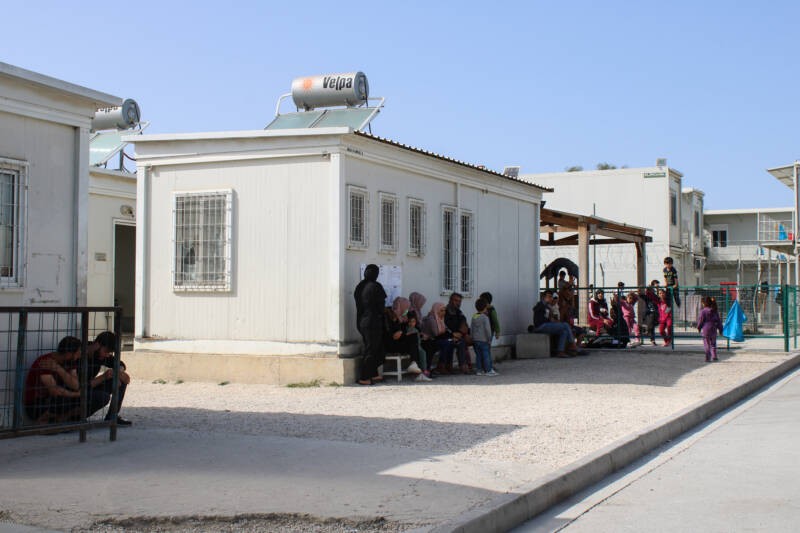
Recently arrived asylum seekers avoid the sun at Cyprus’ Pournara Reception Center, 27/03/2024 (Hanna Davis/Syria Direct)
“Instead of having these people get into the boat, the EU should help Lebanon,” Georgiades said. On April 2, Cyprus’ President Nikos Christodoulides said he had personally asked the EU Commission to induce Lebanese authorities to stop migrant departures.
Christodoulides is set to visit Lebanon on May 2 to broker an agreement with the EU aimed at stemming departures from Lebanese shores. The agreement is expected to involve EU financial support to Lebanese authorities, such as the army, to manage migration.
Policing the sea
As the number of Syrian asylum seekers continued to rise this month, Cyprus intensified its policing of the seas in cooperation with Lebanon.
On April 17, Cypriot maritime police prevented five boats, which embarked from Lebanon carrying hundreds of Syrians, from reaching Cyprus’ waters. A day before, the police confirmed Cyprus would deploy coast guard patrol boats off Lebanon’s coast to intercept migrants under an agreement reached on April 8, Cyprus Mail, an English-language daily, reported.
Alarm Phone, a hotline for migrants crossing the Mediterranean Sea to the EU, reported that the boats were trapped at sea for days between Lebanon and Cyprus without sufficient supplies. The group also said Cypriot maritime police refused to give those aboard any assistance and threatened them with guns and violence.
Muhammad Sablouh, a human rights lawyer in Lebanon with the Cedar Center for Legal Studies, told Syria Direct that one of the boats returned to the Syrian coastal city of Tartus on the night of April 17. The four others returned to Lebanon’s northern coastal city of Tripoli on the same day.
Of the four boats that returned to Lebanon, one was intercepted by the army before it arrived. Sablouh, who is in touch with the Lebanese army and those who were on board, said that the army deported seven or eight passengers to Syria because they, like the vast majority of Syrians in Lebanon, did not have residency documents.
In recent months Lebanese authorities have arbitrarily detained, tortured and forcibly returned refugees to Syria, part of a wave of repression and violence against Syrians in the country, Human Rights Watch (HRW) reported on April 25.
‘A lot of risks’
Of those Syrians who evade the authorities and make it to Cyprus, most do not intend to stay, 26-year-old Muhammad Daoud told Syria Direct in Pournara at the end of March. He had been there for two months, but hoped to continue to another country in Europe.
Daoud, who is originally from Syria’s eastern Deir e-Zor province, said he paid thousands of dollars to a smuggler who told him “we’d stay here [in Cyprus] for a bit and then go to Germany. He said it was the Cyprus route to Europe.”
En route from Syria to Cyprus, Daoud and a friend who accompanied him on the journey were both injured after they said a Cypriot police boat collided with their small fishing boat. Daoud’s foot was broken. His friend’s leg was fractured, and later amputated due to a post-surgical infection.
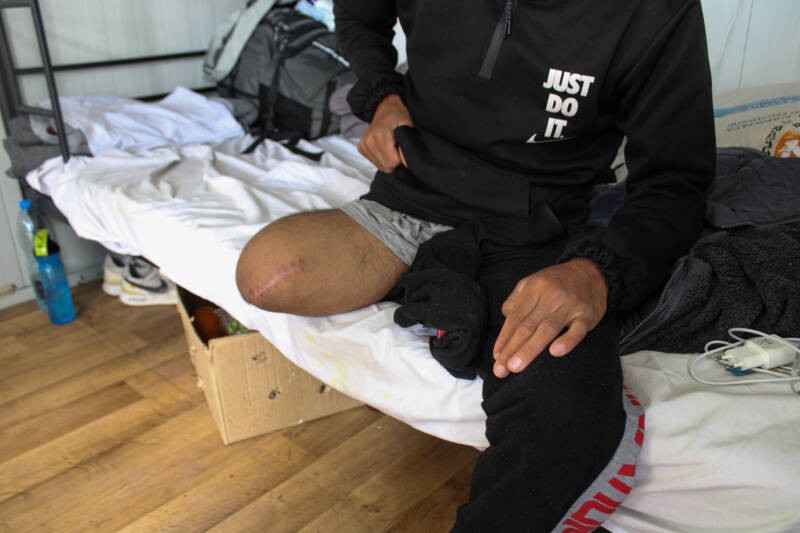
Muhammad Daoud made the crossing from Syria to Cyprus with a friend (pictured). Both were injured by a police boat collision, and his friend’s leg was later amputated, 27/03/2024 (Hanna Davis/Syria Direct)
“There are a lot of risks [to irregular migration by boat],” UNHCR’s Cyprus representative Katja Saha told Syria Direct at her office in Nicosia. Smugglers often leave vessels drifting “halfway through the journey” and the “completely unprepared passengers” are left to navigate on their own, she added.
Some board the boats because “there’s no legal path to join family members in Cyprus,” Saha added. Around 80 percent of Syrians in Cyprus are given “subsidiary protection status,” which is granted to those who do not meet the government’s requirements for refugee status but still face serious harm if returned to their country of origin.
In Cyprus, those with subsidiary protection status are not entitled to family reunification, under which those with refugee status can apply for their family members to legally join them.
As the number of Syrians arriving by boats to Cyprus has risen, so too has the number of unaccompanied Syrian minors, Saha added—another side effect of the lack of formal family reunification procedures.
“While the [refugee] reception system has improved significantly overall, it has not improved sufficiently for the children,” Saha said. Shelters for unaccompanied children are at capacity, so many are being housed in vacant hotels where they do not have access to education or adequate services for extended periods of time.
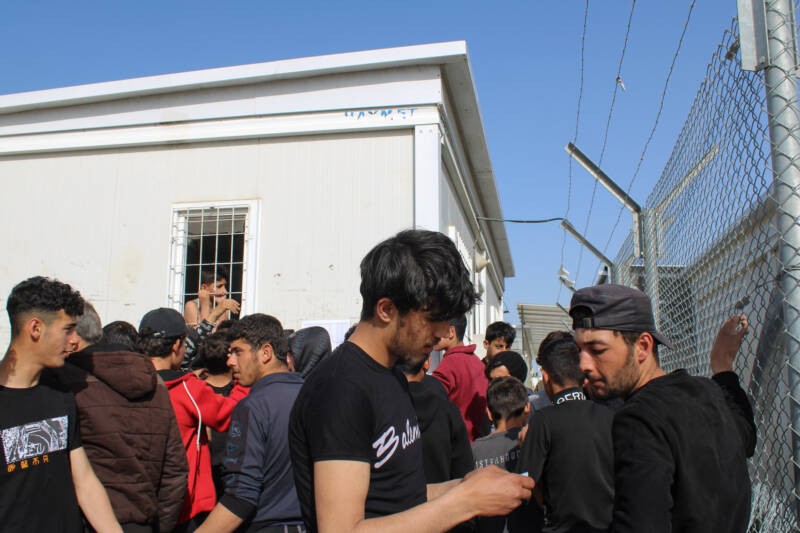
Mostly Syrian men at Pournara wait to see if they have made it onto a list to be allowed to leave the camp, 27/03/2024 (Hanna Davis/Syria Direct)
Search and rescue
Not long after al-Ahmad and her husband buried Saifuddin at sea, Cypriot maritime police radar spotted their boat on February 29 about 67 miles (about 108 kilometers) south of the island. A patrol vessel took those aboard to the southern coastal town of Larnaca, and later to the Pournara Reception Center.
The family’s experience, while tragic, is not unique. Multiple boats loaded with migrants and asylum seekers have been left stranded or have disappeared off the Cypriot coast over the past year. Rights groups criticize Cyprus for failing to protect asylum seekers and migrants at sea.
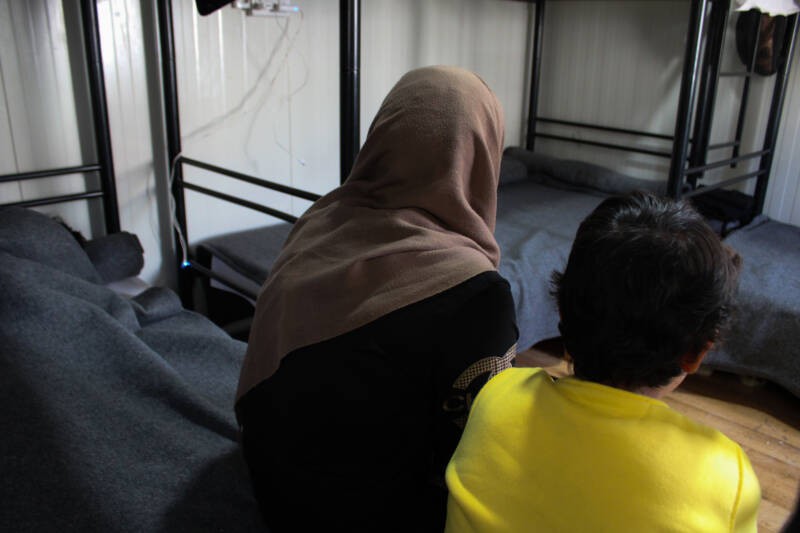
Rihab al-Ahmad sits with one of her children inside her caravan at the Pournara Reception Center in Cyprus, 27/03/2024 (Hanna Davis/Syria Direct)
KISA, a human rights NGO in Cyprus, has accused Cypriot rescue teams of delaying searches for stranded migrants and failing to implement “all the technical means at their disposal.”
In one case, KISA said it notified Cypriot maritime authorities on January 20 of a boat in distress after it appeared its engine had stopped two days into its journey from Lebanon. But Cypriot maritime authorities did not find the boat until four days later, resulting in the death of one child and hospitalization of three others.
“These people [Cypriot coast guard] are getting paid to watch the seas. If you want to rescue people, judging by the water and winds, I’m sure you could spot exactly where the boat ended up,” Doros Polycarpou, the head of KISA, told Syria Direct.
KISA has also criticized the Cypriot government for focusing on “criminalized and repressive” policies to deter Syrians from coming, rather than strengthening rescue response mechanisms. The rights group holds that Cyprus is violating its international search and rescue obligations and hindering access to asylum and protection from refoulement.
Syria Direct reached out to the Cyprus Joint Rescue Coordination Center (JRCC), which coordinates with the Port and Marine Police, multiple times for comment, but received no response by the time of publication.
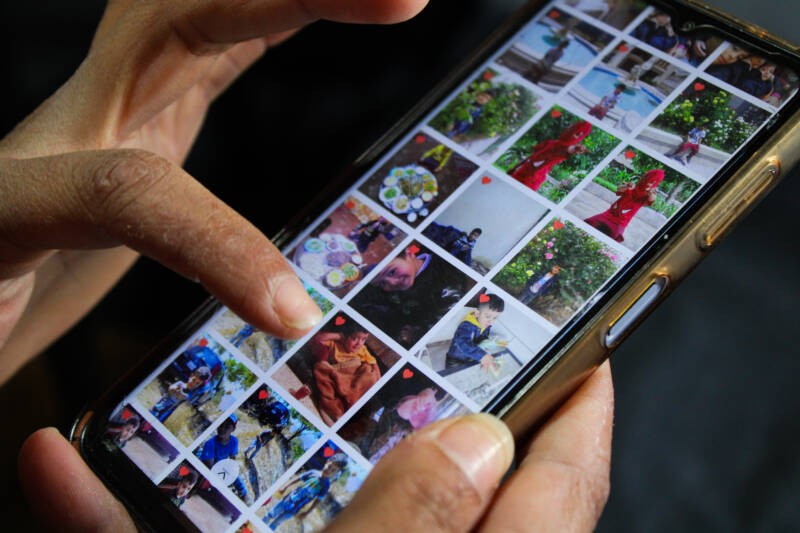
Rihab al-Ahmad scrolls through a photo album of her son, six-year-old Saifuddin, who died during the family’s Mediterranean Sea crossing from Syria to Cyprus, 27/03/2024 (Hanna Davis/Syria Direct)
Sleepless nights
Al-Ahmad has spent many sleepless nights in Cyprus, plagued with regret for the danger her children faced during their journey. “It doesn’t leave my mind,” she said.
“I came to Cyprus all because of my children,” al-Ahmad said. “So I could get them out of the environment in Syria and they could have [a better] life and education.”
Pulling out her smartphone, al-Ahmad opened an album filled with photos of Saifuddin. She scrolled through, gazing at the images with longing.
In one photo, Saifuddin plays outside with his older brother at their home in the Aleppo countryside. In another, he wears a Spiderman costume, holding out his hands to mimic the Marvel character’s signature move. Picture after picture, he smiles playfully, his cheeks glowing with innocent joy.

